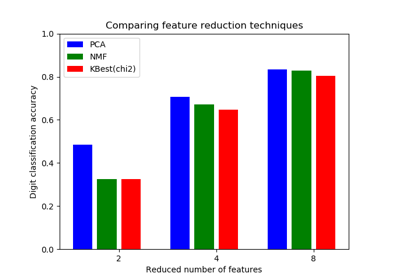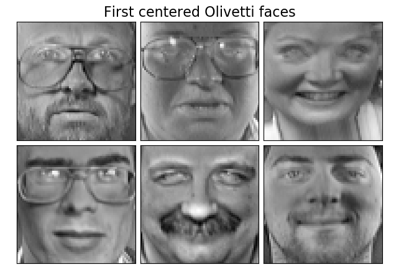sklearn.decomposition.NMF¶
-
class
sklearn.decomposition.NMF(n_components=None, init=None, solver=’cd’, beta_loss=’frobenius’, tol=0.0001, max_iter=200, random_state=None, alpha=0.0, l1_ratio=0.0, verbose=0, shuffle=False)[source]¶ Non-Negative Matrix Factorization (NMF)
Find two non-negative matrices (W, H) whose product approximates the non- negative matrix X. This factorization can be used for example for dimensionality reduction, source separation or topic extraction.
The objective function is:
0.5 * ||X - WH||_Fro^2 + alpha * l1_ratio * ||vec(W)||_1 + alpha * l1_ratio * ||vec(H)||_1 + 0.5 * alpha * (1 - l1_ratio) * ||W||_Fro^2 + 0.5 * alpha * (1 - l1_ratio) * ||H||_Fro^2
Where:
||A||_Fro^2 = \sum_{i,j} A_{ij}^2 (Frobenius norm) ||vec(A)||_1 = \sum_{i,j} abs(A_{ij}) (Elementwise L1 norm)
For multiplicative-update (‘mu’) solver, the Frobenius norm (0.5 * ||X - WH||_Fro^2) can be changed into another beta-divergence loss, by changing the beta_loss parameter.
The objective function is minimized with an alternating minimization of W and H.
Read more in the User Guide.
Parameters: - n_components : int or None
Number of components, if n_components is not set all features are kept.
- init : ‘random’ | ‘nndsvd’ | ‘nndsvda’ | ‘nndsvdar’ | ‘custom’
Method used to initialize the procedure. Default: ‘nndsvd’ if n_components < n_features, otherwise random. Valid options:
- ‘random’: non-negative random matrices, scaled with:
- sqrt(X.mean() / n_components)
- ‘nndsvd’: Nonnegative Double Singular Value Decomposition (NNDSVD)
- initialization (better for sparseness)
- ‘nndsvda’: NNDSVD with zeros filled with the average of X
- (better when sparsity is not desired)
- ‘nndsvdar’: NNDSVD with zeros filled with small random values
- (generally faster, less accurate alternative to NNDSVDa for when sparsity is not desired)
- ‘custom’: use custom matrices W and H
- solver : ‘cd’ | ‘mu’
Numerical solver to use: ‘cd’ is a Coordinate Descent solver. ‘mu’ is a Multiplicative Update solver.
New in version 0.17: Coordinate Descent solver.
New in version 0.19: Multiplicative Update solver.
- beta_loss : float or string, default ‘frobenius’
String must be in {‘frobenius’, ‘kullback-leibler’, ‘itakura-saito’}. Beta divergence to be minimized, measuring the distance between X and the dot product WH. Note that values different from ‘frobenius’ (or 2) and ‘kullback-leibler’ (or 1) lead to significantly slower fits. Note that for beta_loss <= 0 (or ‘itakura-saito’), the input matrix X cannot contain zeros. Used only in ‘mu’ solver.
New in version 0.19.
- tol : float, default: 1e-4
Tolerance of the stopping condition.
- max_iter : integer, default: 200
Maximum number of iterations before timing out.
- random_state : int, RandomState instance or None, optional, default: None
If int, random_state is the seed used by the random number generator; If RandomState instance, random_state is the random number generator; If None, the random number generator is the RandomState instance used by np.random.
- alpha : double, default: 0.
Constant that multiplies the regularization terms. Set it to zero to have no regularization.
New in version 0.17: alpha used in the Coordinate Descent solver.
- l1_ratio : double, default: 0.
The regularization mixing parameter, with 0 <= l1_ratio <= 1. For l1_ratio = 0 the penalty is an elementwise L2 penalty (aka Frobenius Norm). For l1_ratio = 1 it is an elementwise L1 penalty. For 0 < l1_ratio < 1, the penalty is a combination of L1 and L2.
New in version 0.17: Regularization parameter l1_ratio used in the Coordinate Descent solver.
- verbose : bool, default=False
Whether to be verbose.
- shuffle : boolean, default: False
If true, randomize the order of coordinates in the CD solver.
New in version 0.17: shuffle parameter used in the Coordinate Descent solver.
Attributes: - components_ : array, [n_components, n_features]
Factorization matrix, sometimes called ‘dictionary’.
- reconstruction_err_ : number
Frobenius norm of the matrix difference, or beta-divergence, between the training data
Xand the reconstructed dataWHfrom the fitted model.- n_iter_ : int
Actual number of iterations.
References
Cichocki, Andrzej, and P. H. A. N. Anh-Huy. “Fast local algorithms for large scale nonnegative matrix and tensor factorizations.” IEICE transactions on fundamentals of electronics, communications and computer sciences 92.3: 708-721, 2009.
Fevotte, C., & Idier, J. (2011). Algorithms for nonnegative matrix factorization with the beta-divergence. Neural Computation, 23(9).
Examples
>>> import numpy as np >>> X = np.array([[1, 1], [2, 1], [3, 1.2], [4, 1], [5, 0.8], [6, 1]]) >>> from sklearn.decomposition import NMF >>> model = NMF(n_components=2, init='random', random_state=0) >>> W = model.fit_transform(X) >>> H = model.components_
Methods
fit(X[, y])Learn a NMF model for the data X. fit_transform(X[, y, W, H])Learn a NMF model for the data X and returns the transformed data. get_params([deep])Get parameters for this estimator. inverse_transform(W)Transform data back to its original space. set_params(**params)Set the parameters of this estimator. transform(X)Transform the data X according to the fitted NMF model -
__init__(n_components=None, init=None, solver=’cd’, beta_loss=’frobenius’, tol=0.0001, max_iter=200, random_state=None, alpha=0.0, l1_ratio=0.0, verbose=0, shuffle=False)[source]¶
-
fit(X, y=None, **params)[source]¶ Learn a NMF model for the data X.
Parameters: - X : {array-like, sparse matrix}, shape (n_samples, n_features)
Data matrix to be decomposed
- y : Ignored
Returns: - self
-
fit_transform(X, y=None, W=None, H=None)[source]¶ Learn a NMF model for the data X and returns the transformed data.
This is more efficient than calling fit followed by transform.
Parameters: - X : {array-like, sparse matrix}, shape (n_samples, n_features)
Data matrix to be decomposed
- y : Ignored
- W : array-like, shape (n_samples, n_components)
If init=’custom’, it is used as initial guess for the solution.
- H : array-like, shape (n_components, n_features)
If init=’custom’, it is used as initial guess for the solution.
Returns: - W : array, shape (n_samples, n_components)
Transformed data.
-
get_params(deep=True)[source]¶ Get parameters for this estimator.
Parameters: - deep : boolean, optional
If True, will return the parameters for this estimator and contained subobjects that are estimators.
Returns: - params : mapping of string to any
Parameter names mapped to their values.
-
inverse_transform(W)[source]¶ Transform data back to its original space.
Parameters: - W : {array-like, sparse matrix}, shape (n_samples, n_components)
Transformed data matrix
Returns: - X : {array-like, sparse matrix}, shape (n_samples, n_features)
Data matrix of original shape
- .. versionadded:: 0.18
-
set_params(**params)[source]¶ Set the parameters of this estimator.
The method works on simple estimators as well as on nested objects (such as pipelines). The latter have parameters of the form
<component>__<parameter>so that it’s possible to update each component of a nested object.Returns: - self




